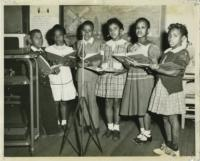A Description Of The Musical Concepts Artist-Level Jazz Musicians Employ While Improvising
View
@ University of Mississippi Libraries
Whitmire, Jonathan
Description
The purpose of this study is to analyze musical concepts employed by artist-level jazz performers (professional jazz musicians) playing an improvised solo. These concepts are then compared to the participant's pedagogical background in improvisation. Subjects were videorecorded performing an improvised solo with an accompaniment track of "Take the A' Train". They then participated in an observational research method referred to as stimulated recall where each performer watched the video directly following the performance and attempted to classify the musical concepts they used in their improvised solo. Categories of musical concepts included: scales/modes, chords/arpeggios, memorized licks, melodic variation, rhythmic variation, range/intensity, sequence, and other. Participants classified these categories in two ways. They first recorded their data by making selections using a computer program called scribe. Video recordings were then made of each performer's comments while listening to the improvised recording. Following the exercise each participant filled out a survey indicating pedagogical background and performance experiences. Results suggest that improvisers most often use a variety of preconceived musical ideas (memorized licks, sequence, phrasing), however, much of the musical content is also derived through knowledge and application of music theory (scale/chord relationships), especially as it relates to jazz. Several participants referred to this in terms of a language in which they have become fluent. All but one participant cited improvisation classes and/or lessons as the introduction to this musical language.
Text
Application/Pdf
2013 01 01 T08:00:00 Z

















![...Junior School of Music, Howard University [children on steps and around fountain : panoramic acetate film photonegative] ...Junior School of Music, Howard University [children on steps and around fountain : panoramic acetate film photonegative]](https://d2l9jrtx1kk04i.cloudfront.net/9c4aa7f0e0f2351da712b06972cf5003134be323.png)



